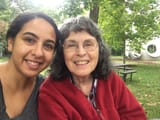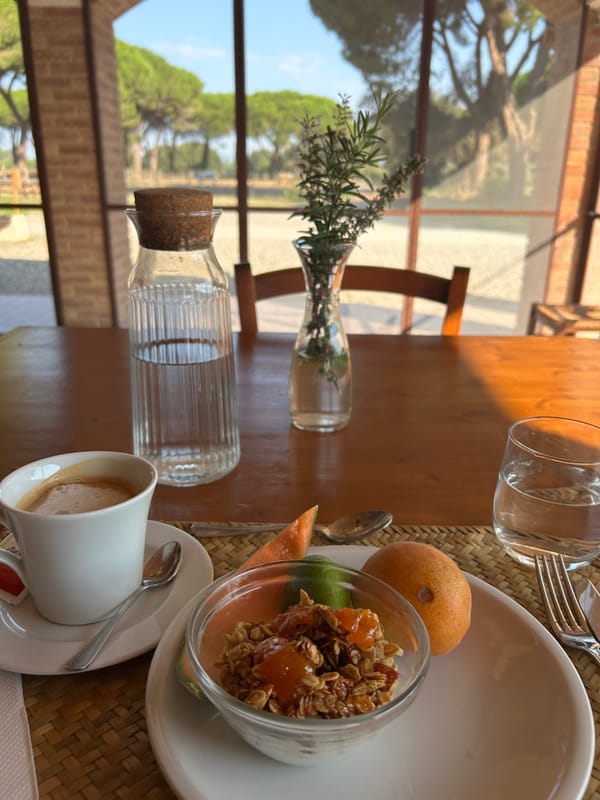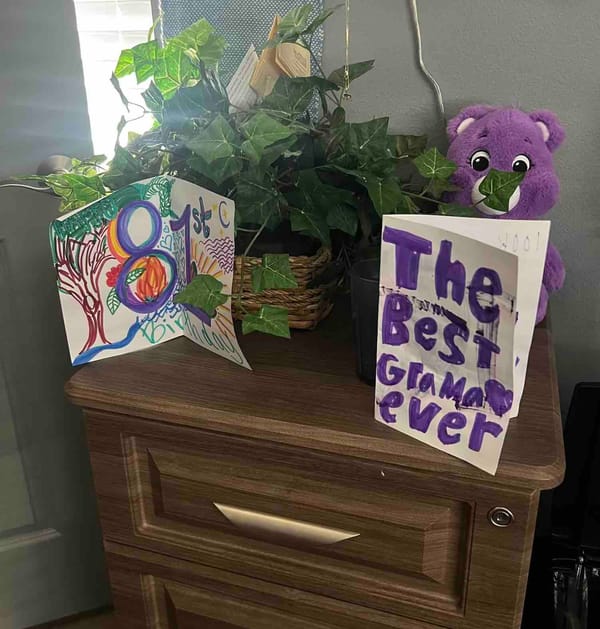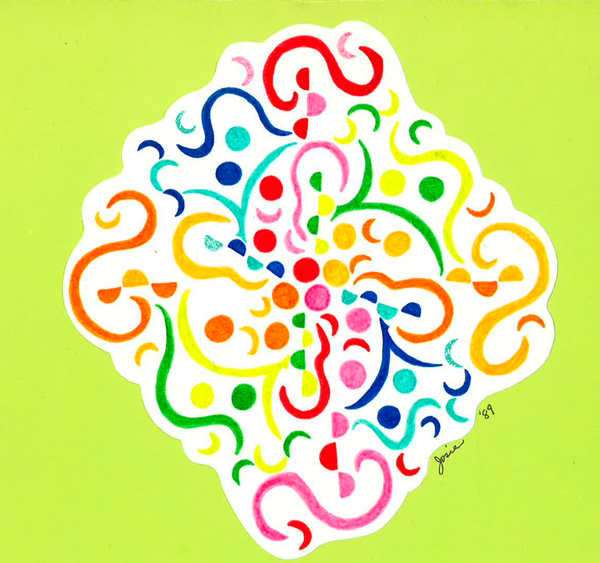'Are You My Sister?'

In which my Josie-mama thinks I am her sister and I find a letter my mother wrote to her sister after she died in my mother's arms.
Buckets of appreciation to the great Gaurav Madan and lovely Lexi Spencer-Notabartolo for reading early drafts. And an extra dose of gratitude to Mas Palou and Maria Vallès and family for a beautiful residency experience back in 2021, where I wrote, cried and went on walks with Pisca. And thank you to Prerna for introducing me to Maria ✨.
December 11, 2021, Bentonville, Arkansas
When I walked in, her eyes lit up as they often do. “Did you come, by yourself?” she asked. I told her I was staying nearby so I could visit and we could take walks.
To which she responded, with tender curiosity, “Oh. Are you my sister?”
Having read experiences with Alzheimer’s patients in which one is not supposed to disagree or further confuse them, I wasn’t sure if I should pretend.
“I'm actually your daughter, but a daughter and a sister are basically — once we get older — basically the same thing, right?”
“Oh, that's right,” she said, staring deeply into my eyes. “And those beautiful eyes are just — wonderful.”
She paused.
“I'm just overwhelmed,” she said, half-smiling and half looking like she might burst into tears.
I couldn’t tell if she was confused by me and I didn’t want to overwhelm her. I smiled gently as the tears welled up in her eyes and I thought she might cry.
My mother is an easy crier. Her repeated refrain has been “It’s okay to cry.” And like farting, she abides by the “better out than in” principle. The way she measured a good book was whether or not she cried in it. Airport drop-offs and pickups were often tearful moments, as were movies and maybe even an occasional moment of awe — like a beautiful sunset.
Then she paused again.
And, as if the previous moment disappeared with a snap, she asked me again, “Who are you?”
I told her, with as much love and patience as I could muster, “I'm 'your darling angel youngest daughter.' It's okay if you don't remember, though.” Repeating the term of endearment she used for me.
She smiled sleepily, and said with not-quite-convincing confidence, “I remember that.”
This was the first time I visited when it was clear she didn’t know exactly who I was. Still, she knew that I was someone special. She took my hand in hers.
“This hand,” she said, as if recognizing my hand as different than all other hands. I could sense her appreciation but also felt as though she might be seeing me as if it was the first time — “those beautiful eyes, are just — wonderful,” she said again.
I smiled, thinking to myself, ‘thanks Ma, you made them!’ There’s something sweet and strange about speaking to the person who birthed you, as if she is seeing you for the first time. Yet still, she recognized me as her sister.
When I told my older sister of the mix-up she reminded me that Mom always said I looked like Francie, her youngest sister. As I had been sifting through my mother’s writings for the past few months, I recalled the letter I found that my mother wrote to her youngest sister — several years after Francie died from Leukemia.
My aunt, my mother’s youngest sister died in my mother’s arms in the early 1970s.
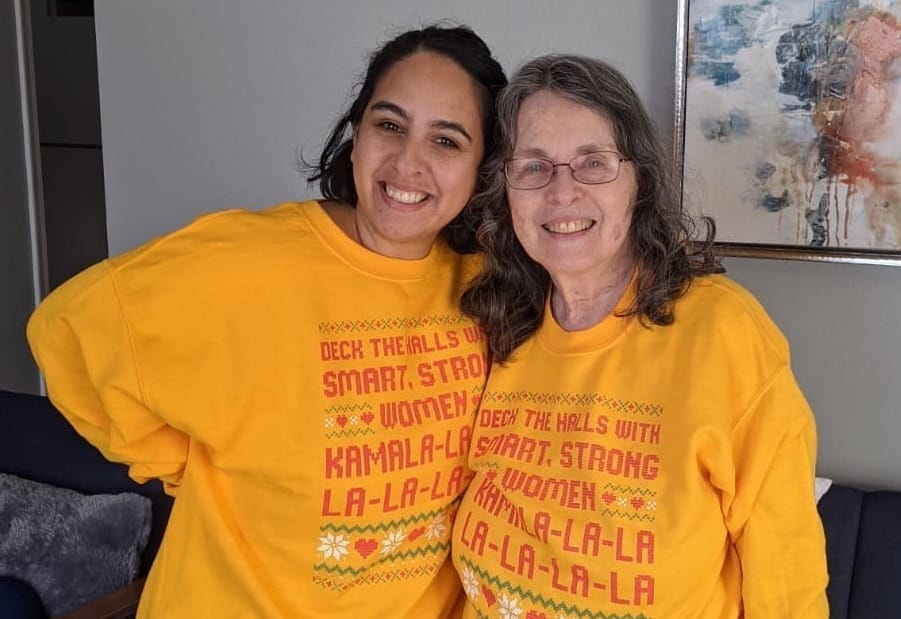
In Josie’s Words: Letter to My Sister
5-9-89
Dearest Francie, my little Francheska,
My little sister who was taller and bigger than I was when we were young women together in the late 60s and very early 70s.
I’m writing you a letter on paper which is really a letter from my heart to yours wherever you are. I’m writing on the evening of your death so many years ago. It’s between 9:30 and 10:00 about the same time I held you when you died. I had read Doug some stories and he had fallen asleep. When I came out of his room I heard some sounds from your room. I came in and it as though you put your arms toward me. You were so weak and breathing very quickly and deeply. I put the sides of your hospital bed down and laid next to you and held you. I held you close to me and also in a way we could see each other's faces. Your eyes were full of fear, relief and love. For a split moment of panic, I wondered if I should run and call an ambulance — they could give you some air. But I remembered what you had said.
“When the end comes, just hold me.”
I still wasn’t comfortable. Maybe I should run and call our other sister Izzy to hurry over and be here. She was 45-minutes away. I heard your words again.
“When the end comes, just hold me.”
So I began to relax and be in the moment as you had taught me so well to be. I stroked your hair and head. Your breathing became more and more difficult. I kept wanting to give you more air. I kissed you on your cheek and told you I loved you. In the next few moments I finally stopped wanting to do anything except be there with you. My heart was pounding so hard as your breathing was more and more difficult.
There was a much greater life force working in this room than one sister holding another as she was dying. There was a joyous, free, loving spirit being released from an imprisonment of five years in a diseased body. I looked into your eyes and the fear was gone.
Your breathing stopped and there was an absolute stillness in the room except for the pounding of my own heart. I know it seems strange to recount your last moments of life to you. Because of course you were there, but I wanted you to know how it was for me.
Because of your truth I was able to be there with you.
Through all the exhaustion and frustration and misunderstanding in taking care of you the last couple of months at home, we reached a real depth in our loving. For years after, I thought maybe it wasn’t right, maybe something should have been different, and I kept hearing the police say: “Why did you wait so long to call us?”
Now in my healing process I understand the divine beauty and honor and love of those last moments we shared together, and I thank you for entrusting them to me.
I let go of you gently and went to call Izzy. I came back and sat by your lifeless body. I put my hand on your chest and cried. For a long time I sat in the quiet dark. My mind and heart were flooded with memories of our loving and being together.
Here are some excerpts from my journal which reflect those incredible times.
“One night Doug and I were staying with Francie in her city apartment in Boston. We were awakened alarmingly several times from the sirens and horns of the largest city fire department across the street. Doug was so excited he got up each time to watch the men slide down the poles and hang on to the trucks as they hurried out. Then waited for them to return to see the hook n ladder try to back into the station. I lay there awhile and looked at my “little sister.” She slept soundly and deeply, almost unconsciously. This was her third year with Leukemia. From the glow of the street light I noticed the appointment card for the previous afternoon at the hospital clinic. I knew she hadn’t been there because that was just the time we were at Fenway park feeding the ducks and taking a walk.
The clinic offered her pills, injections, radiation, talk of surgery, always x-rays - all ‘maybe’, all experimental, all causing effects like nausea, bloating, gaining or losing excessive weight, hair loss, burning in her stomach and mouth, but no cure. She renounced doctors, hospitals and experimental medicine unless absolutely necessary.
She spent her medical welfare money on her favorite things: pizza and Chinese food, subs and jamocha shakes from Arby’s, concerts and records. When she was strong enough she loved to take walks, read Rod McKuen, listen to music, paint and write.
One month she bought a beautiful long black silky dress at the thrift store instead of paying her electric bill. I started to talk to her about the reasonableness and responsibility of paying a bill that would provide a necessary service before she spent money on things for fun. She looked at me and said, “I’m dying, and I’m being reasonable for the little bit of life I have left right now.”
Shortly thereafter she went into the hospital for six to eight weeks and had to give up the apartment anyway. The electric bill didn’t matter. We hung the dress in her hospital room at her request.
“It’s really an evening dress” she would say, “But I’m always so tired in the evenings. I liked to take walks in my beautiful black dress or just go to the park in it and sit and read.”
Francie began to teach me to be in the present and not to always think and talk in terms of the future.
Francie began to teach me to be in the present and not to always think and talk in terms of the future. The future depressed her. The moment of her aliveness and awareness was precious to her. To go to school and earn a degree, to get a job and earn money and save for goods and services and future needs was not her reality. At first I had little to say, but after a while we were touching each other at new depths. She still greatly feared death, but at least we shared thoughts about it and we were so open with our laughing, loving, and crying.
One afternoon I drove into Boston with some groceries for Francie. As I approached her street I saw the hook n ladder up to her fifth floor window, and a crowd of people below. Several thoughts passed through my mind: She jumped, she collapsed, someone broke in, there’s a fire. I parked quickly and ran upstairs and knocked on the door frantically.
Francie answered the door smiling. Two firemen were just leaving.
“I locked myself out,” she said “and I went to my ‘neighbors’ for help.”
I don’t know anyone else who would consider the largest fire department in the city as their ‘neighbor’ and at her simple request receive that kind of help. Francie had a rapport with people that I have not seen too often. Whether she was taking a walk in the woods with someone or talking on a crowded subway, whatever thoughts and feelings were expressed to her were important. She could spend five minutes with someone and know their innermost thoughts and dreams.
Mom had wanted Francie to live with her in Northfield, Illinois to take care of her, even though she herself had breast cancer. It would be like taking a wild goose whose wings may be diseased but not broken and placing a cage around her, for fear of sudden death in flight, and yet that flying represents her freedom. Francie’s sense of freedom was her strength and courage to go on with her life. Her family and friends who were close to her knew that at any moment she may collapse.
On three different occasions with me she did: One day at the beach, one early evening in a restaurant and one afternoon when we were out for a walk. At those times she went back into the hospital for a few weeks to get her blood count balanced and stabilized enough to go on the next adventure.
At another time it was an exciting Sunday evening with a double-birthday celebration of close friends. We had lasagna dinner and a great frisbee game afterwards. We were now bringing birthday pies and ice cream — neither of our friends cared for cake. We had carefully placed the appropriate number of candles in between the lattice work on the cherries and into the whipped cream of the banana cream, when the phone rang. It was a call for me.
“Please take a message and I’ll call back later.”
“It’s your sister from Boston.”
For a split second I thought of returning her call later, but something was very uncomfortable about that. Taking the phone in the other room, I asked the others to go on with the celebration.
A sobbing weak voice came over the phone “I’m sorry to bother you. I’m so scared and so sick. I just want to see you.”
It was my youngest sister, Francie. This was her fifth year of Leukemia which had gotten progressively worse. I shared with her the surprise that Doug and I would be there in three weeks. How many times in the last few years had anyone of us called the other crying and upset and closed our conversations laughing. And so it was with this one. We laughed about the time I had spent the night in her hospital room against all the rules. I made a bed on the floor between her bed and the wall, where no one would see me. I fell asleep. When the nurse came in to check on Francie, I coughed in my sleep. Francie coughed when I coughed. The nurse finally left and just thought she was acting a little strange. This telephone seemed magical for it severed the distance of miles and allowed us to touch, to comfort, to feel the sadness and then have room to laugh.
When I got off the phone, the celebrations were over and people were going home. In the stillness and darkness of the same very early morning, a loud ringing phone awoke me. It was my sister Izzy’s calm and quiet voice,
“Francie had a stroke tonight. Her right side is paralyzed and she lost her speech. She’s ok. She’s at the hospital now. I love you. I know you will be with us as soon as possible.”
Rocking in the rocking chair, thoughts were streaming through my head and tears were streaming down my cheeks. Within my heart was the treasure of the evening’s conversation… our last one. I remembered the split-second thought that had crossed my mind earlier of returning her call tomorrow.
Where is tomorrow? Must we weigh, balance and constantly select our priorities, often not consciously, because the next moment of the time may change our possibilities.”
Dearest Francie, I’m closing my letter now. I just wanted you to know that the seeds of truth and honesty that you helped plant and nurture in me have really grown. They have allowed me to heal, grow, change, and be more fully who I am. Which was so important to you.
“Be what you are,” you always said, “Because if that doesn’t work… nothing will.”
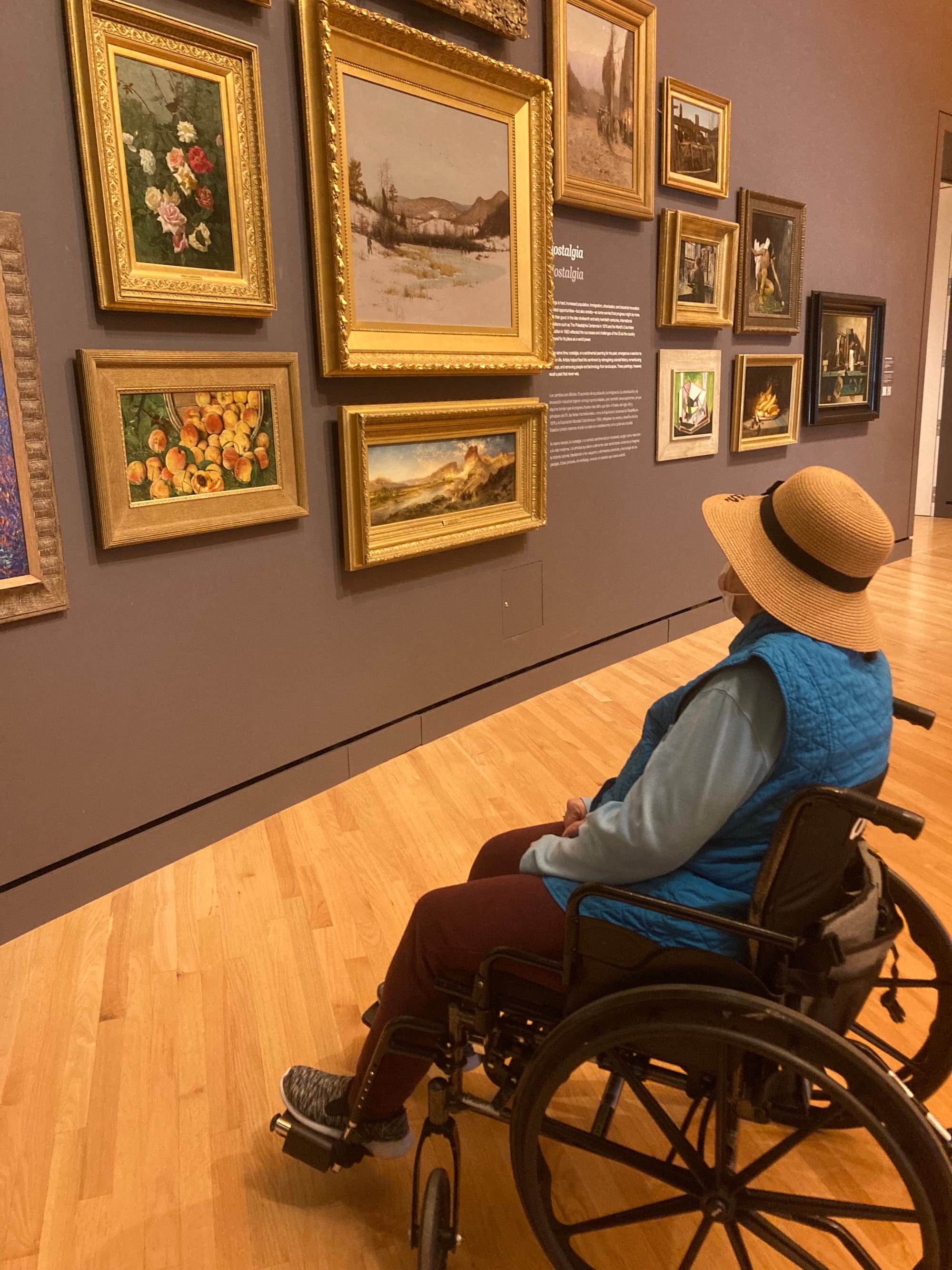


Josie enjoying art at Crystal Bridges Museum. Bentonville, Arkansas. Various dates 2020-2021.
This post is part of a series of essays called Josie's House. Previous essays can be found here:
- New Beginning: In which I try figure out how to tell people that the doctor at your assisted living facility referred you to hospice care — meaning that based on your weight loss and decline, you are expected to be gone within six months.
- Mom Rocks: In which I attempt to introduce my mother and this project.
